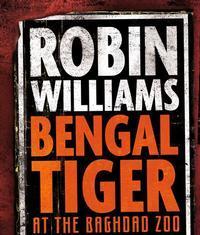 A lone tiger speaks to the audience on stage, cynical and uncensored, giving us his philosophy on the meaning of life. That’s not something you’re likely to see at a visit to the Bronx Zoo, nor would the tiger be actor Robin Williams.
A lone tiger speaks to the audience on stage, cynical and uncensored, giving us his philosophy on the meaning of life. That’s not something you’re likely to see at a visit to the Bronx Zoo, nor would the tiger be actor Robin Williams.
Portraying the role of the Bengal tiger, Williams is brilliant and although it’s not the biggest part in the play, it is the most thought-provoking.
If you take away anything from “The Bengal Tiger at the Baghdad Zoo,” it’s that war is devastating. It changes anyone around it or in it, and not for the better. It makes you do things you never thought you would or could do. It can turn you into somebody you don’t even recognize. In this war, it isn’t who you are when you go in, but who you are when you come out, and can you live with yourself as that person?
Bold, witty, dark, and entertaining, the story takes place in Baghdad in the year 2003, right after the American invasion. With a phenomenal cast made up of mostly unknown actors, the show recounts a gripping story about the harsh realities of war. The story is told in part by a Bengal tiger who we get to see in both life and death and by two American soldiers and an Iraqi translator.
Kev and Tom are the two young American soldiers guarding a Bengal tiger in the Baghdad zoo in his cage. The tiger bites off Tom’s hand and Kev kills it. From there, the story takes you on a provocative journey with characters trapped in an earthly hell amidst violence, grief, confusion, and loneliness.
Kev, played so convincingly by Brad Fleischer, is the not too bright American soldier who tends to run his mouth and brag about imaginary feats. Although he talks tough, it’s obvious that Kev is just a scared, little boy in a war he isn’t ready to fight.
Tom, the slightly smarter and greedier American soldier, is well portrayed by Glenn Davis. Angry that he lost his hand to the tiger and not in real action, Tom’s goal is to reclaim possession of a gold gun and gold toilet seat he took during a raid at the Hussein home.
Tony-nominated Arian Moayad delivers a moving performance as Musa, an Iraqi Arabic translator for the American soldiers. Once a gardener who created topiaries of animals for the ruthless Uday Hussein, Musa is still fraught with the guilt of his sister’s murder and is haunted by her memory.
The most charismatic performance of the show is given by Hrach Titizian, who plays the slain Uday Hussein. Uday haunts Musa while carrying around and speaking to the head of his brother Qusay in a plastic bag, which is a gruesome, but quite amusing.
Playwright Rajiv Joseph, also a Pulitzer Prize Finalist for this work, has created a unique look into the consequences of war; how it infects everyone in its path, and what it truly means to be ‘lost.’
The play is very adult and raw, and definitely not meant for children. Confrontational with its theme, the play makes you think, feel, and question things you don’t want to. The experience will leave you uncomfortable, but that’s exactly the point.
This performance ran from March 3, 2011- July 3, 2011 at the Richard Rodgers Theatre.

Leave a Reply